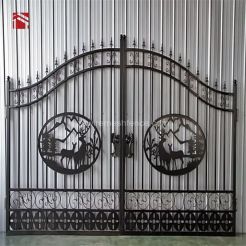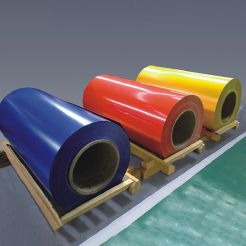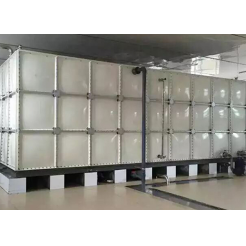Smooth Geomembrane HDPE Liner
A smooth geomembrane is a type of geomembrane that has a smooth surface. It is typically made of high-density polyethylene (HDPE) or polyvinyl chloride (PVC). Smooth geomembranes are used in a variety of applications, including landfill liners, dams, and aquaculture ponds. Smooth geomembranes are a versatile and reliable type of geomembrane that can be used in a wide variety of applications.
Product Description
Smooth geomembrane?
A smooth geomembrane is a type of geomembrane that has a smooth surface. It is typically made of high-density polyethylene (HDPE) or polyvinyl chloride (PVC). Smooth geomembranes are used in a variety of applications, including landfill liners, dams, and aquaculture ponds. Smooth geomembranes are a versatile and reliable type of geomembrane that can be used in a wide variety of applications. They are strong, durable, and resistant to a variety of environmental factors, making them a good choice for demanding applications.
Materials:
High-density polyethylene (HDPE): HDPE is a thermoplastic material that is known for its strength, durability, and chemical resistance. HDPE smooth geomembranes are often used in applications where they will be exposed to harsh conditions, such as landfill liners and dams.
Polyvinyl chloride (PVC): PVC is another thermoplastic material that is known for its strength, durability, and chemical resistance. PVC smooth geomembranes are often used in applications where they will be exposed to chemicals, such as wastewater treatment plants and aquaculture ponds.
Polypropylene (PP): Polypropylene is a strong and lightweight material that is often used in applications where weight is a concern. PP smooth geomembranes are often used in roofing and waterproofing applications.
Ethylene propylene diene monomer (EPDM): EPDM is a rubber-like material that is known for its flexibility and resistance to weathering. EPDM smooth geomembranes are often used in applications where they will be exposed to extreme temperatures, such as solar panel arrays and roofing applications.
The best material for a smooth geomembrane will depend on the specific requirements of the application. For example, HDPE may be the best choice for applications where strength and durability are important, while PVC may be the best choice for applications where chemical resistance is important.
What is the thickness of Smooth geomembrane?
The thickness of a smooth geomembrane can vary depending on the specific application and the required strength and durability. However, some common thicknesses for smooth geomembranes include:
0.5 mm: This thickness is typically used for applications where the geomembrane will not be exposed to heavy loads or sharp objects. For example, it may be used as a liner for a swimming pool or a pond.
1 mm: This thickness is typically used for applications where the geomembrane will be exposed to moderate loads or sharp objects. For example, it may be used as a liner for a landfill or a dam.
2 mm: This thickness is typically used for applications where the geomembrane will be exposed to heavy loads or sharp objects. For example, it may be used as a liner for a waste disposal facility or a chemical plant.
3 mm: This thickness is typically used for applications where the geomembrane will be exposed to extreme conditions, such as high temperatures or chemicals. For example, it may be used as a liner for a nuclear waste facility or a petroleum refinery.
What are the applications of Smooth Geomembrane?
Mining: It’s used to prevent leakage of harmful materials associated with extraction and processing.
Landfill liners: Smooth geomembranes are often used as liners in landfills to prevent leachate from leaking into the environment.
Dams: Smooth geomembranes are used as liners in dams to prevent water from seeping through the dam and causing flooding.
Aquaculture ponds: Smooth geomembranes are used as liners in aquaculture ponds to prevent fish from escaping and to prevent water from seeping out of the pond.
Wastewater treatment plants: Smooth geomembranes are used in wastewater treatment plants to prevent contaminated water from leaking into the environment.
Recreational facilities: Smooth geomembranes are used in recreational facilities, such as swimming pools and water parks, to prevent water from leaking out of the facility and to prevent the growth of algae.
Chemical plants: Smooth geomembranes are used in chemical plants to prevent chemicals from leaking into the environment.
Greenhouses: Smooth geomembranes are used in greenhouses to create a barrier that prevents heat from escaping and cold from entering. This helps to create a more stable environment for plants to grow in.
Roof coverings: Smooth geomembranes are used as roof coverings to prevent water from leaking into a building. They are also resistant to ultraviolet radiation, which can damage other types of roofing materials.
Highways: Smooth geomembranes are used in the construction of highways to prevent water from seeping into the ground and causing erosion. They are also used to prevent the growth of vegetation on the sides of highways, which can be a safety hazard.
Military applications: Smooth geomembranes are used in military applications, such as aircraft hangars and fuel storage facilities, to prevent leaks and spills. They are also used to create temporary shelters and barriers.
Performance
Smooth geomembranes have a flat and smooth surface, providing excellent impermeability and barrier properties.
Strength and durability: smooth geomembrane is made from high-density polyethylene (HDPE), which is a strong and durable material. It has a tensile strength of 15 MPa and a tear strength of 200 kN/m, making it resistant to tears, punctures, and abrasion.
Chemical resistance: smooth geomembrane is resistant to a variety of chemicals, including acids, bases, and solvents. This makes it a good choice for applications where it will be exposed to chemicals, such as wastewater treatment plants and chemical plants.
UV resistance: smooth geomembrane is resistant to ultraviolet radiation, which can damage other types of geomembranes. This makes it a good choice for applications where it will be exposed to sunlight, such as landfill liners and dam liners.
Impermeability: smooth geomembrane is impermeable to water, making it a good choice for applications where it is important to prevent leaks, such as landfill liners and dam liners.
Ease of installation: smooth geomembrane is easy to install. It can be welded together to create a seamless barrier.
Cost-effective: smooth geomembrane is a cost-effective solution for a variety of applications. It is a durable and reliable material that can save money in the long run by preventing leaks and spills.
Dimensions
|
Thickness |
Roll Size (Width By Length) |
|
|
GM 050 |
0.50mm | 7mx420m |
|
GM 075 |
0.75mm |
7mx280m |
|
GM 100 |
1.00mm |
7mx210m |
|
GM 125 |
1.25mm |
7mx168m |
|
GM 150 |
1.50mm |
7mx140m |
|
GM 200 |
2.00mm |
7mx105m |
|
GM 250 |
2.50mm |
7mx84m |
| GM 300 | 3.00mm |
7mx70m |
Packages
| Rolls (In a 40HC Container) | Quantity (In a 40HC Container) | |
| GM 050 | 17 | 49980㎡ |
| GM 075 | 17 | 33320㎡ |
| GM 100 | 17 | 24990㎡ |
| GM 125 | 17 | 19992㎡ |
| GM 150 | 17 | 16660㎡ |
| GM 200 | 17 | 12495㎡ |
| GM 250 | 17 | 9996㎡ |
| GM 300 | 17 | 8330㎡ |






Email: 3653174086@qq.com
Mob.: +86 136 0531 1263
Tel.: +86 136 0531 1263
Fax: +86189 4358 6025
WeChat: +86 136 0531 1263
WeChat: +86 151 9415 0202
Whatsapp: +8618943586025
Add.: Zhangqiu, Jinan, Shandong. China 250200








